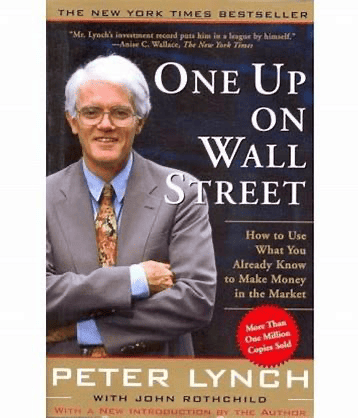Overview: One Up On Wall Street
-
Book Title: One Up on Wall Street
-
Author: Peter Lynch
-
Publication Date: March 1989
-
Rating: 4.5
-
price: $9.99
-
Pages: 304
About the Author
Peter Lynch is a legendary investor and former manager of the Magellan Fund at Fidelity Investments. Known for his straightforward approach to investing, Lynch popularized the concept of "buy what you know" and achieved an average annual return of 29% during his 13-year tenure, making him one of the most successful fund managers in history.
One Up On Wall Street - Introduction
In the ever-evolving world of finance and investing, few books have stood the test of time quite like Peter Lynch's "One Up On Wall Street." First published in 1989, this investment classic continues to offer valuable insights for both novice and experienced investors. As we navigate the complex landscape of modern finance, including emerging trends like cryptocurrencies and evolving market dynamics, Lynch's wisdom remains remarkably relevant.
One Up On Wall Street Book Summary
Peter Lynch, the legendary former manager of Fidelity's Magellan Fund, presents a compelling case for individual investors in "One Up On Wall Street." His central thesis is both simple and revolutionary: average investors can outperform Wall Street professionals by leveraging their personal knowledge and experiences. Lynch introduces readers to his famous "invest in what you know" philosophy, encouraging investors to look for opportunities in their daily lives. He breaks down stocks into six categories:
- Slow growers
- Stalwarts
- Fast growers
- Cyclicals
- Asset plays
- Turnarounds
This categorization helps investors understand different investment opportunities and tailor their strategies accordingly.
Analysis of Themes
Empowering Individual Investors
Lynch's approach democratizes investing, making it accessible to everyone. He argues that by paying attention to products and services they use, investors can identify promising companies before they become widely known on Wall Street.
The Importance of Research
While Lynch encourages trusting one's instincts, he emphasizes the critical role of thorough research. He provides practical guidance on reading financial statements, assessing company fundamentals, and analyzing industry trends. This balanced approach of intuition and analysis is crucial in today's information-rich environment.
Long-Term Perspective
In an era of high-frequency trading and market volatility, Lynch's advice to maintain a long-term perspective is more relevant than ever. He cautions against market timing and emphasizes the importance of patience in achieving investment success.
Writing Style
Lynch's writing is refreshingly accessible, demystifying complex financial concepts with humor and relatable anecdotes. His use of real-life examples, particularly when discussing his famous "tenbaggers" (investments that increase tenfold), brings his investment principles to life.
"Go for a business that any idiot can run - because sooner or later, any idiot probably is going to run it."
This quote exemplifies Lynch's practical, no-nonsense approach to investing, which resonates throughout the book.
Strengths and Weaknesses
Strengths:
- Accessible to beginners while offering value for experienced investors
- Practical, actionable advice
- Empowering approach that builds investor confidence
- Timeless principles that apply across market cycles
Weaknesses:
- Some examples and market conditions are dated
- Limited discussion of modern financial instruments and technologies
- May underestimate the challenges faced by individual investors in today's complex markets
One Up On Wall Street Related Books
While "One Up On Wall Street" shares similarities with other investment classics like Benjamin Graham's "The Intelligent Investor," Lynch's focus on individual investor empowerment sets it apart. Unlike more technical works, such as "A Random Walk Down Wall Street" by Burton Malkiel, Lynch's book strikes a balance between theory and practical application. In the context of personal finance literature, "One Up On Wall Street" complements books like "Rich Dad Poor Dad" by Robert Kiyosaki, offering specific investment strategies to build upon general financial principles.
Highlights from One Up On Wall Street by Peter Lynch
Invest in What You Know: Lynch advocates investing in companies you understand and encounter in daily life.
Research is Key: Conduct thorough research; a successful investor needs to know a company’s fundamentals, products, and market position.
Long-Term Perspective: Focus on holding quality stocks for the long term to allow growth potential to unfold.
Ignore Market Noise: Don’t be swayed by market trends or hype; focus on a company’s real value.
Different Stock Categories: Lynch categorizes stocks (e.g., slow growers, fast growers) to guide investment strategy.
Trust in Individual Insights: Use personal observations as an advantage over professional investors.
Conclusion
Peter Lynch's "One Up On Wall Street" remains a cornerstone of investment literature, offering timeless wisdom in an ever-changing financial landscape. Its enduring popularity is a testament to the universal applicability of Lynch's principles. For modern investors navigating complex markets, emerging technologies like cryptocurrencies, and evolving banking systems, Lynch's emphasis on understanding what you invest in is more crucial than ever. While the specific examples may be dated, the underlying principles of thorough research, patience, and leveraging personal knowledge continue to be valuable. Whether you're a beginner looking to start your investment journey or an experienced investor seeking to refine your strategy, "One Up On Wall Street" offers invaluable insights. It's a must-read for anyone serious about taking control of their financial future.


![One Up On Wall Street: How to Use What You Already Know to Make Money in the Market [Paperback] Lynch](https://m.media-amazon.com/images/I/51RWLY76LAL._SL500_.jpg)


